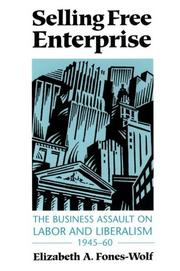| Listing 1 - 4 of 4 |
Sort by
|

ISBN: 0252031199 0252073649 9780252031199 9780252073649 Year: 2006 Publisher: Urbana (Ill.) : University of Illinois press,
Abstract | Keywords | Export | Availability | Bookmark
 Loading...
Loading...Choose an application
- Reference Manager
- EndNote
- RefWorks (Direct export to RefWorks)
Labor unions and radio --- Labor unions --- Mass media and business --- Radio broadcasting --- History --- Public relations --- Political aspects

ISBN: 0252021185 Year: 1994 Publisher: Urbana University of Illinois
Abstract | Keywords | Export | Availability | Bookmark
 Loading...
Loading...Choose an application
- Reference Manager
- EndNote
- RefWorks (Direct export to RefWorks)

ISBN: 0252064399 Year: 1994 Publisher: Urbana University of Illinois Press
Abstract | Keywords | Export | Availability | Bookmark
 Loading...
Loading...Choose an application
- Reference Manager
- EndNote
- RefWorks (Direct export to RefWorks)
Book
ISBN: 0252097009 0252039033 132296565X 0252080661 9780252097003 9780252039034 9780252080661 Year: 2015 Publisher: Urbana
Abstract | Keywords | Export | Availability | Bookmark
 Loading...
Loading...Choose an application
- Reference Manager
- EndNote
- RefWorks (Direct export to RefWorks)
"This study provides new answers to one of the most perplexing questions facing historians of labor and of the South: why were workers so resistant to the efforts of unions and liberals to reform the region? Elizabeth and Ken Fones-Wolf add evangelical Protestantism to the narrative of how workers responded to organized labor's most ambitious effort to transform the U.S. South in the decades after World War II: the CIO's Operation Dixie (1946-53). The authors investigate how the Depression and World War II, and the economic restructuring that accompanied them, affected the religious culture of the South and the outlook of evangelical Protestants. Drawing on deep research in denominational archives and newspapers and in records of national church organizations, the CIO, and business organizations, they examine the religious backgrounds and outlooks of the individuals the CIO sent to the South and discuss how these messengers -- who represented denominational backgrounds quite different from those of their would-be constituents -- looked to southern ministers and congregants. They also use oral histories to consider how workers' religious beliefs guided their choices to join or reject the CIO's appeal. By making the sacred a major element in the story of struggle for southern economic justice and positioning class as a central aspect of southern religion, the Fones-Wolfs provide new and nuanced understandings of how southerners wrestled with the options available to them in this crucial period of change and possibility"-- "In 1946, the Congress of Industrial Organizations (CIO) undertook Operation Dixie, an initiative to recruit industrial workers in the American South. Elizabeth and Ken Fones-Wolf plumb rarely used archival sources and rich oral histories to explore the CIO's fraught encounter with the evangelical Protestantism and religious culture of southern whites. The authors' nuanced look at working-class religion reveals how laborers across the surprisingly wide evangelical spectrum interpreted their lives through their faith. Factors like conscience, community need, and lived experience led individual preachers to become union activists and mill villagers to defy the foreman and minister alike to listen to organizers. As the authors show, however, all sides enlisted belief in the battle. In the end, the inability of northern organizers to overcome the suspicion with which many evangelicals viewed modernity played a key role in Operation Dixie's failure, with repercussions for labor and liberalism that are still being felt today. Identifying the role of the sacred in the struggle for southern economic justice, and placing class as a central aspect in southern religion, Struggle for the Soul of the Postwar South provides new understandings of how whites in the region wrestled with the options available to them during a crucial period of change and possibility. "--
Labor unions --- Labor movement --- Evangelicalism --- Christian conservatism --- Social classes --- Evangelical religion --- Protestantism, Evangelical --- Labor and laboring classes --- Industrial unions --- Labor, Organized --- Labor organizations --- Organized labor --- Trade-unions --- Unions, Labor --- Unions, Trade --- Working-men's associations --- Organizing --- History. --- Religious aspects --- Christianity. --- Congress of Industrial Organizations (U.S.) --- C.I.O. --- CIO --- Congreso de Organizaciones Industriales --- Kongress proizvodstvennykh profsoi︠u︡zov SShA --- Evangelical Revival --- Fundamentalism --- Pietism --- Protestantism --- Social movements --- Societies --- Central labor councils --- Guilds --- Syndicalism --- American Federation of Labor. --- AFL-CIO --- RELIGION / Christianity / Protestant. --- HISTORY / United States / 20th Century. --- POLITICAL SCIENCE / Labor & Industrial Relations.
| Listing 1 - 4 of 4 |
Sort by
|

 Search
Search Feedback
Feedback About UniCat
About UniCat  Help
Help News
News